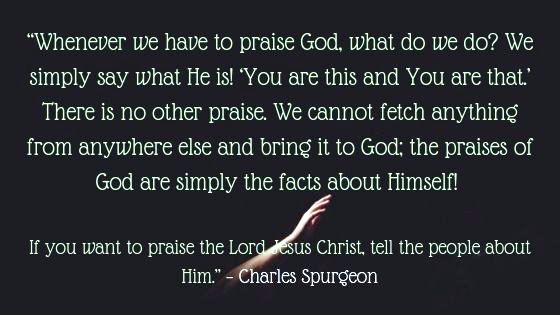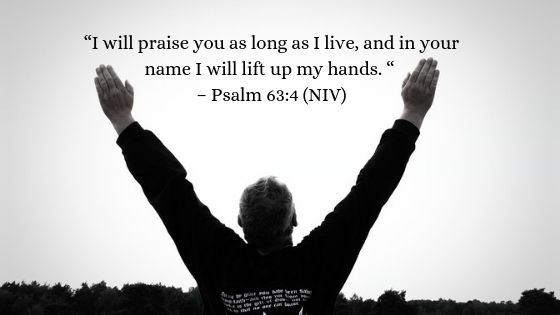Whether you celebrate Lord’s Day on a Saturday, Sunday, or other days of the week, praise and worship have become a regular part of the service. But what is praise and what is worship? What are the differences between the two? The focus of this article is praise and all its elements.
The Meaning of Praise
The word praise is from the Hebrew word yadah, which means “To stretch out the hand.” That is, to hold out the hands in reverence, to open the hands and let go of everything, to just stand and praise God open-handedly.
Praise is closely intertwined with thanksgiving, which is the joyful recounting of all God has done for us. When we praise God, we are actually offering Him back appreciation for His mighty works on our behalf. In other words, praise is an expression of our thankfulness.
But is that what praise is all about? An expression of thankfulness to God for all the great things He has done for us? Of course not! To praise God is to acknowledge the glories of His excellent person.
As Charles Spurgeon said, “When we praise God, we simply say what He is because the praises of God are simply the facts about Himself.”

In Scripture, praise is usually presented as energetic, lively or active and uninhibited.
Praise the Lord
Considering that Psalms is a book of praise, it is fitting that the last five chapters (Psalm 146-150) begin with Hallelu Yah – hallelujah – “Praise the Lord!” The exclamation point denotes an excitement, an exuberance, a shouting.
Jehovah (or Yah, for Yahweh) is the covenant name of the Lord. It reminds us that He loves us and has covenanted to save us, keep us, care for us, and eventually glorify us, because of the sacrifice of Jesus Christ, His Son, on the cross.
The greatness of God is something to shout about. He created all that is. He cared for all He created. He provided salvation when mankind fell into sin. The power of the blood of Jesus has forever broken Satan’s reign over us; the time is coming when He will be forever banished to the eternal fire.
God promises a kingdom to come and we serve a risen Savior who has gone to prepare a place for us so we can spend eternity with Him. No wonder that “praise from the upright is beautiful” (Psalm 33:1).
Praise is Obligatory
Praise is a command. Angels and heavenly hosts are commanded to praise the Lord (Psalm 89:5; Psalm 103:20; Psalm 148:2) and all inhabitants of the earth are instructed to praise the Lord (Psalm 117:1; Psalm 138:4; Matthew 21:16; Psalm 148:1-14).
From the heavens, in the heights, the sun, moon, stars, water, the sea creatures, the depths, stormy wind, the mountains and hills, fruitful trees and all cedars, beasts and all cattle, all peoples: young men, maidens, old men, children – praise the name of the Lord!
 Psalm 148:1-14 reads like a roll call asking for every created thing to celebrate God’s greatness. God created all that is. He also sustains all that is. Were it not for Jesus Christ “upholding all things by the word of His power” (Hebrews 1:3) the entire universe would fly apart, totally disintegrate into nothingness.
Psalm 148:1-14 reads like a roll call asking for every created thing to celebrate God’s greatness. God created all that is. He also sustains all that is. Were it not for Jesus Christ “upholding all things by the word of His power” (Hebrews 1:3) the entire universe would fly apart, totally disintegrate into nothingness.
Ever since creation, God has continued to hold His creation together. Further, He supplies the needs of His creation. Psalm 104 lists just a few of the ways God provides for the creatures He made, including mankind.
God invites all kinds of praise from His creation. In fact, Jesus said that if people don’t praise God, even the stones will cry out (Luke 19:40).
How to Praise the Lord
1. We praise the Lord with joyful singing.
Psalm 9:11
“Sing praises to the Lord, who dwells in Zion! Declare His deeds among the people.”
In Psalm 9, David offers wholehearted praise to the Lord for delivering him and his army from the enemy nations that attacked Israel. He also calls upon the suffering remnant to sing praises to God because He is on their side and fights their battles.
The emphasis is on joyful praise and David’s aim was to honor the Lord, not to glorify himself.
Psalm 149:2, 5
“Let Israel rejoice in their Maker; let the children of Zion be joyful in their King. Let the saints be joyful in glory; let them sing aloud on their beds.”
In the Old Testament, songs were written to commemorate important events. A song of praise reminds us that God takes pleasure in our joyful praise.
Joy is a matter of choice, a positive attitude that we choose to express. Joy is not a gift delivered to our door each morning. When the events of our lives seem out of control, we must find our joy in the Lord, which produces the strength we need to get through the tough times.
Related Article: The Biblical Roots of Christian Praise & Worship
Children will praise the Lord with great joy as they sing songs like “Jesus Loves Me.” Their trusting and meek spirit makes a beautiful melody. When the children were in the temple shouting, “Hosanna to the Son of David,” the priests and scribes were upset by these words.
Jesus asked them, “Have you never read, ‘Out of the mouth of babes and nursing infants You have perfected praise?” (Matthew 21:16).
We need to take a lesson on praising the Lord from our children and let our praise be a song of testimony about the greatness and glory of God.
2. We praise the Lord with shouting.
Psalm 66:1
“Make a joyful shout to God, all the earth!!”
As in the previous and the next psalm, Psalm 66 has the whole earth in view and not only Israel. The psalmist understood that God was not only God over Israel but the entire universe. The psalmist then invites all the Gentile nations to praise God with joyful shouting for what He had done for Israel (Psalm 66:5-7).
We offer to the Lord shouts of praise in response to his marvelous works.
3. We praise the Lord with dancing and musical instruments.
Psalm 149:3 (Also Psalm 150:4-5)
“Let them praise His name with the dance; let them sing praises to Him with the timbrel and harp.”
The Jews were very expressive people; they used musical instruments, songs, and dances in their worship of the Lord. These dances, of course, were not modern ballroom or club dances but rather interpretive dances that pointed to the Lord and not to a person’s talent (see Exodus 15:20; Judges 11:34).
Here’s a beautiful messianic praise dance on the song Baruch Adonai by the Restored to Glory Dance Ministry. Watch and be blessed.
To dance before the Lord the way King David did calls for an unreserved celebration of our faith. Since the Christian life is a life of joy and celebration, we are able to freely dance in celebration of our joy in the Lord.
Why We Praise the Lord
The Bible gives us numerous reasons to praise the Lord:
- Because of His majesty, greatness, and power (Psalm 145:3-5; Psalm 21:13).
- Because of His glory and excellency (Psalm 138:5; Psalm 148:13).
- Because of His goodness and mercy (Psalm 107:8, 15, 21; 2 Chronicles 20:21).
- Because of His loving-kindness, faithfulness, and truth (Psalm 138:2; Isaiah 25:1).
- Because He has provided salvation (Luke 1:68-69) and has done wonderful works (Psalm 150:2; Psalm 107:8, 15, 21, 31).
In today’s world of uncertainty, God is worthy to be praised for the reason that He alone can be trusted.
Psalm 146:5
“Happy is he who has the God of Jacob for his help, whose hope is in the Lord his God.”
When times are unsure, there is only one sure hope – God. Not rank or position. Not military might. Not reputation. Not wealth. Not political friends. Not social status. All these power plays are empty when it comes to building a sure foundation for life, especially eternal life.
People and circumstances come and go like the fog every morning. To trust in them for ultimate help is foolish. But “the Lord shall reign forever” (Psalm 146:10). He is able and sure to help.
Praise the Lord in Times of Trouble
Psalm 147:3, 5
“He heals the brokenhearted and binds up their wounds. Great is our Lord, and mighty in power; His understanding is infinite.”
When we are in the desert of our days, we need to praise the Lord. When we are in the valley of the shadow of death, we need to praise the Lord. When we are surrounded by our enemies, we need to praise the Lord. When are discouraged and weary, and overwhelmed with problems, we need to praise Him.
As Jeff and Sheri Easter’s song says, “When everything fall apart, praise His name…”
Praise His Name Lyrics and Chords
We are never closer to God than we humble ourselves completely in His presence (Psalm 147:6). There in the shelter of His arms, we will find that His love never changes, and His mercy endures forever (Psalm 136:1-26).
Even though praise, as mentioned earlier, is intertwined with thanksgiving, we should not praise God only when things are going our way. We should praise the Lord for anything and everything (Philippians 4:6).
Closing Thoughts
In the sacrifice of praise, we bow in humble adoration before the Savior. While some people may see that as a sign of weakness and think we’re foolish, we praise God because we believe in a risen Savior. We praise God for all that we have and all that we are. In doing so, we witness to the unbelieving world that Jesus lives.

Jesus Christ died at Calvary as God’s sacrifice for our sins. When He said, “It is finished,” the ritual of sacrifices was over – forever. He does not want a goat, a dove, or a lamb.
The only sacrifice God wants now is the sacrifice of our praise. He wants living, praising men and women.


Thanks for the powerful article on elements of praise. It has positively impacted my life.
I’m so blessed to hear that; thanks for stopping by, Misley.
Extremely thoughtful and loaded with biblical proof. Beautifully composed and helpful article.
Thank you!
Thanks Piper.
I’m glad you found this article helpful. God bless you!
Wow…..wow…..wow!
Praise His Holy Name. Amen!
Amen, VJ.
Glory to God and thanks for taking the time to read this post.
Stay blessed!